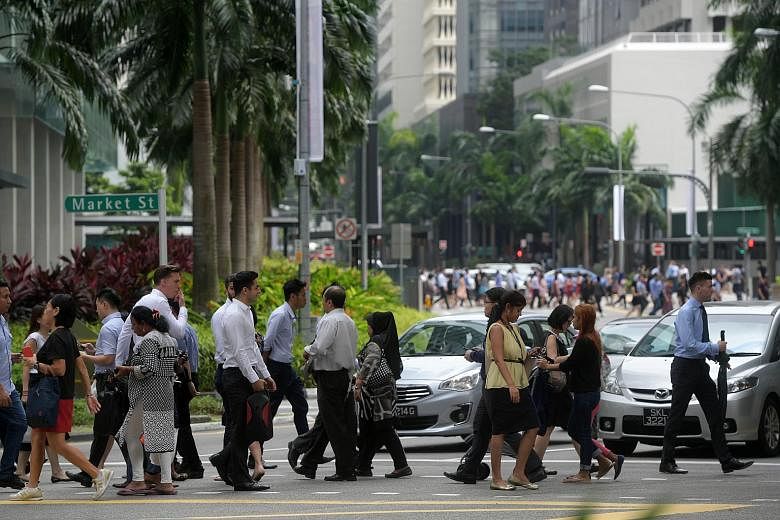SINGAPORE - A record number of business leaders are more confident about the global economy, at least in the short term, though they acknowledge global threats exist, says a PricewaterhouseCoopers' (PwC) survey of almost 1,300 chief executive officers (CEOs) worldwide.
According to the survey, launched at this year's World Economic Forum in Davos on Monday (Jan 22), 57 per cent of the CEOs believe that worldwide economic growth will improve in the next 12 months. That's almost twice the level of 29 per cent from last year, and the largest increase since PwC began asking about global growth in 2012, the accounting firm said.
In the US, optimism in global growth more than doubled from 24 per cent to 59 per cent after a period of uncertainty surrounding the presidential election. Even among less optimistic countries like Japan and the UK, optimism in worldwide growth more than doubled since last year, PwC added.
Said PwC Singapore's executive chairman, Yeoh Oon Jin: "In Singapore, we are also seeing more positive business sentiment. However, with the increasingly complex business landscape, Singapore business leaders will need to find a way to leverage the upturn in the global economy and expand internationally."
This optimism in the economy is feeding into CEOs' confidence of their own growth propects, though the uptick is not so large. Globally, 42 per cent of the CEOs surveyed said they are "very confident" of their company's growth outlook over the next 12 months, up from 38 per cent last year.
Results by countries are mixed though. In the UK where Brexit negotiations only recently reached a milestone, business leaders' drop in short-term confidence from 41 per cent to 34 per cent this year is unsurprising.
Meanwhile in the US, CEOs' confidence has recovered after election nerves last year. Tax reform implemented by the new administration has also seen business confidence for the year ahead rise significantly from 39 per cent in 2017, to 52 per cent in 2018. North America is the only region where a majority of CEOs are "very confident" about their own 12-month prospects.
In addition, several key markets including Australia and China also saw the proportion of CEOs being "very confident" in their own organisation's growth prospects rising. The top three most confident sectors include: technology, business services, and pharmaceutical and life sciences.
Furthermore, confidence in short-term revenue growth is likely to lead to jobs growth, with 54 per cent of business leaders expecting to increase their headcount in 2018. Only 18 per cent of CEOs expect to reduce their headcount this year. Sectors with the highest demand for new recruits include: healthcare, technology, business services, communications, as well as hospitality and leisure.
On digital skills in particular, over a quarter or 28 per cent of business leaders are extremely concerned about their availability within the country they are based.
Despite recent research by PwC showing that employees are optimistic about technology improving their job prospects, CEOs admit that helping workers "retrain and increasing transparency on how automation and AI could impact jobs is becoming a more important issue for them", PwC said.
Two-thirds of CEOs believe they have a responsibility to retrain employees displaced by technology, mainly from the engineering and construction, technology and communications sectors.
"Singapore's workforce of today must recognise that disruption is not just a buzzword and that the way we operate and do business will change drastically. More companies are implementing technologies and adopting systems that pose a real threat to jobs. As the Singapore government pushes the workforce to upskill, individuals must also take responsibility for their own continuous learning to stay relevant in this technology-enabled job market," said Mr Yeoh.
According to PwC, the digital and automation disruption is particularly acute in the financial services sector. Almost a quarter (24 per cent) of banking and capital markets and insurance CEOs plan workforce reductions, with 28 per cent of banking and capital markets jobs likely to be lost to a large extent due to technology and automation.
Notwithstanding optimism in the global economy, anxiety from societal and economic threats is also rising. Specificially, CEOs are "extremely concerned" about geopolitical uncertainty (40 per cent), cyber threats (40 per cent), terrorism (41 per cent), availability of key skills (38 per cent) and populism (35 per cent). Interestingly, these threats outpace familliar concerns such as exchange rate volatility (29 per cent) and changing consumer behaviour (26 per cent).
Underlining this shift, extreme concern about terrorism doubled from 20 per cent in 2017 to 41 per cent in 2018, with terrorism entering the top 10 threats to growth. Other top concerns include over-regulation and increasing tax burden.
In China, key skills availability was the key concern for CEOs, while cyber has become the top threat for CEOs in the US and the UK.
A year after the Paris Agreement was signed by over 190 nations, CEOs' concern about the threat of climate change and environmental damage to growth prospects has also doubled to 31 per cent.
The PwC survey encompassed 1,293 interviews with CEOs in 85 countries undertaken between August and November last year.

